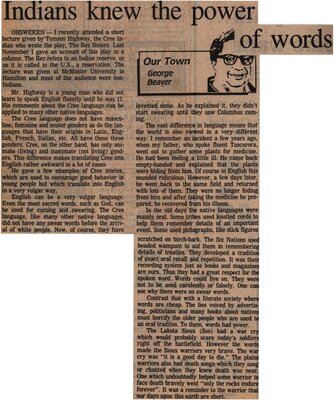"Indians Knew the Power of Words"
- Full Text
- Indians knew the power of words
OHSWEKEN - I recently attended a short lecture given by Tomson Highway, the Cree Indian who wrote the play, The Rez Sisters. Last November I gave an account of this play in a column. The Rez refers to an Indian reserve, or as it is called in the U.S., a reservation. The lecture was given at McMaster University in Hamilton and most of the audience were non-Indians.
Mr. Highway is a young man who did not learn to speak English fluently until he was 17. His comments about the Cree language can be applied to many other native languages.
The Cree language does not have masculine, feminine and neuter genders as do the languages that have their roots in Latin, English, French, Italian, etc. All have these three genders. Cree, on the other hand, has only animate (living) and inanimate (not living) genders. This difference makes translating Cree into English rather awkward in a lot of cases.
He gave a few examples of Cree stories which are used to encourage good behavior in young people but which translate into English in a very vulgar way.
English can be a very vulgar language. Even the most sacred words, such as God, can be used for cursing and swearing. The Cree language, like many other native languages, did not have any swear words before the arrival of white people. Now, of course, they have invented some. As he explained it, they didn't start swearing until they saw Columbus coming.
The vast difference in language means that the world is also viewed in a very different way. I remember an incident a few years ago, when my father, who spoke fluent Tuscarora, went out to gather some plants for medicine. He had been feeling a little ill. He came back empty-handed and explained that the plants were hiding from him. Of course in English this sounded ridiculous. However, a few days later, he went back to the same field and returned with lots of them. They were no longer hiding from him and after taking the medicine he prepared, he recovered from his illness.
In the old days the native languages were mainly oral. Some tribes used knotted cords to help them remember details of an important event. Some used pictographs, like stick figures scratched on birch-bark. The Six Nations used beaded wampum to aid them in remembering details of treaties. They developed a tradition of exact oral recall and repetition. It was their recording system just as books and magazines are ours. Thus they had a great respect for the spoken word. Words could live on. They were not to be used carelessly or falsely. One can see why there were no swear words.
Contrast that with a literate society where words are cheap. The lies voiced by advertising, politicians and many books about natives must horrify the older people who are used to an oral tradition. To them, words had power.
The Lakota Sioux (Soo) had a war cry which would probably scare today's soldiers right off the battlefield. However the words made the Sioux warriors very brave. The war cry was "it is a good day to die." The plains warriors also had death songs which they sang or chanted when they knew death was near. One which undoubtedly helped some warrior to face death bravely went "only the rocks endure forever". It was a reminder to the warrior that our days upon this earth are short.
- Mystery Question
- When was this article published?[Please answer by clicking on the Comments tab]
- Creator
- Beaver, George, Author
- Media Type
- Newspaper
- Item Types
- Articles
- Clippings
- Description
- "I recently attended a short lecture given by Tomson Highway, the Cree Indian who wrote the play, The Rez Sisters. Last November I gave an account of this play in a column. The rez refers to an Indian reserve, or as it is called in the U.S., a reservation. The lecture was given at McMaster University in Hamilton and most of the audience were non-Indians." ...
- Subject(s)
- Personal Name(s)
- Highway, Tomson.
- Local identifier
- SNPL002553v00d
- Collection
- Scrapbook #1 by Janet Heaslip
- Language of Item
- English
- Geographic Coverage
-
-
Ontario, Canada
Latitude: 43.06681 Longitude: -80.11635
-
- Creative Commons licence
 [more details]
[more details]- Copyright Statement
- Public domain: Copyright has expired according to Canadian law. No restrictions on use.
- Copyright Holder
- Brantford Expositor
- Contact
- Six Nations Public LibraryEmail:info@snpl.ca
URL
Mail1679 Chiefswood Rd
PO Box 149
Ohsweken, ON N0A 1M0
519-445-2954


